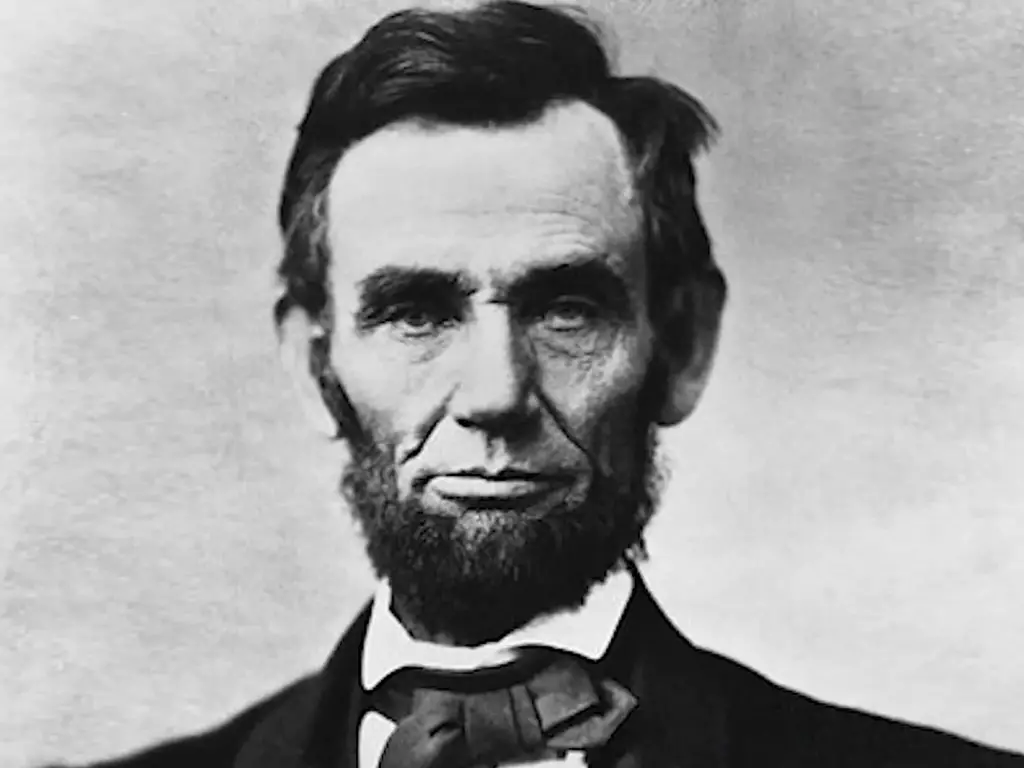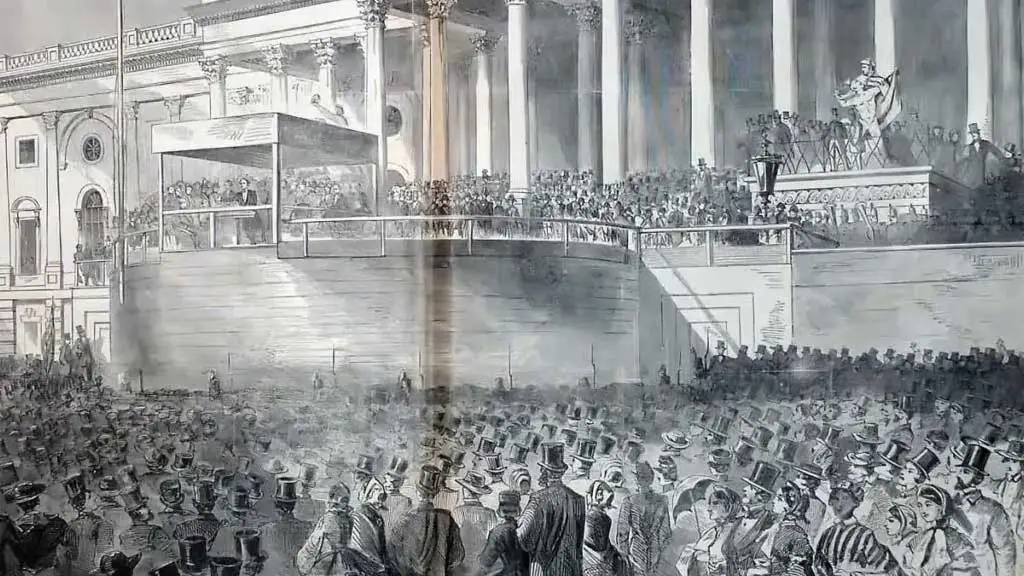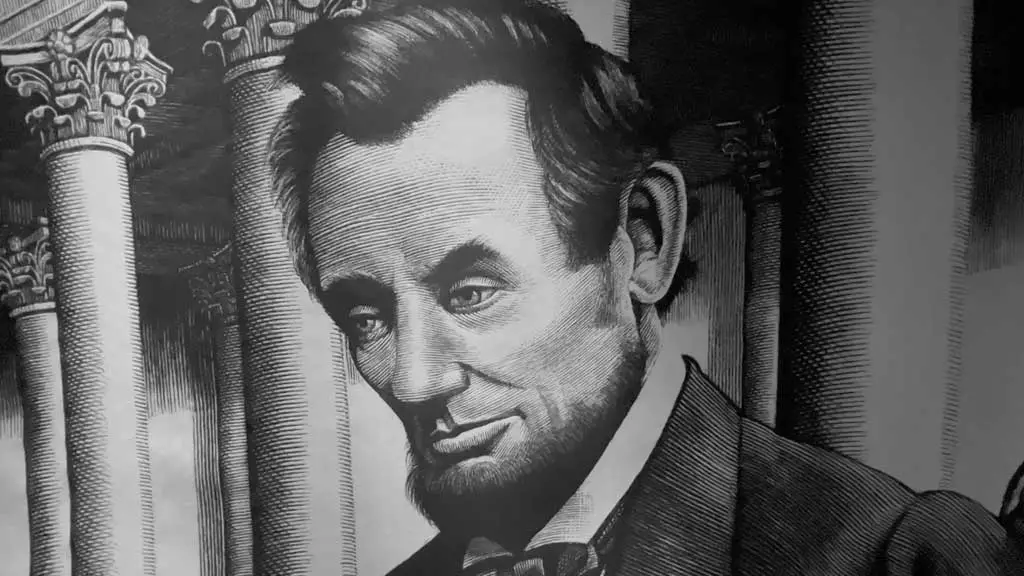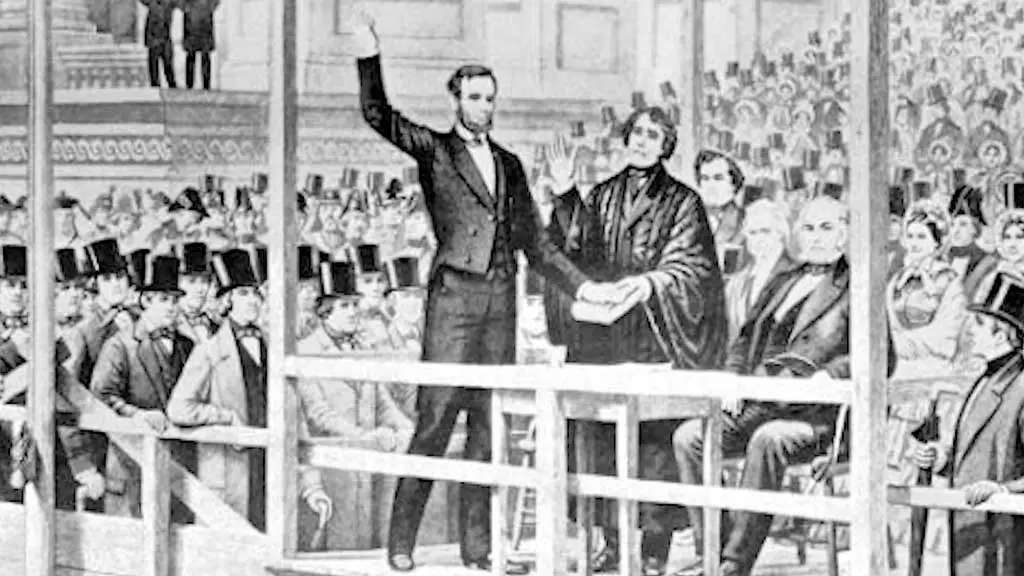Abraham Lincoln’s historic journey from Springfield, Illinois, to Washington, D.C., in February 1861 marked the beginning of his presidency and occurred during a time of national crisis.
Departing his longtime home, Lincoln embarked on a 12-day journey filled with significant stops and public addresses that underscored his commitment to preserving the Union amidst escalating tensions between the North and South.
From his emotional farewell in Springfield to navigating through hostile territory in Baltimore, Lincoln’s journey was fraught with challenges, including credible threats to his life.
His speeches at various stops, including Indianapolis, Cincinnati, Pittsburgh, and Philadelphia, conveyed his vision for national unity and adherence to constitutional principles.
This journey not only highlighted Lincoln’s resilience and strategic acumen but also set the stage for his leadership during the impending Civil War.

Main Stops on Lincoln’s Journey From Springfield to Washington
Abraham Lincoln’s journey from Springfield to Washington, D.C., for his presidential inauguration in 1861 was a historic and eventful one, marked by several significant stops:
Springfield, Illinois
On February 11, 1861, Abraham Lincoln left Springfield, Illinois, his home for nearly 25 years, to assume the presidency.
Before his departure, he delivered an emotional farewell address at the Great Western Railroad Depot.
In his speech, he expressed his deep affection for the city and its people, acknowledging the weight of the responsibilities he was about to undertake.
Lincoln’s departure from Springfield marked the beginning of a crucial journey during a period of national crisis.
Indianapolis, Indiana
Lincoln arrived in Indianapolis later that day, greeted by a large crowd and enthusiastic supporters.
He was escorted to the Bates House, where he gave a speech from the balcony to the assembled throng. During his address, Lincoln emphasized his commitment to upholding the Constitution and preserving the Union.
He reassured the people of Indiana of his dedication to peace and unity, despite the escalating tensions between the North and the South.
Cincinnati, Ohio
The following day, Lincoln continued his journey, arriving in Cincinnati on February 12. There, he was met with great fanfare and delivered a speech at the Burnet House.
He addressed a crowd of both supporters and skeptics, discussing the importance of adhering to the principles of the Founding Fathers.
Lincoln’s message in Cincinnati focused on the need for national solidarity and the role of the government in maintaining order and justice.
Pittsburgh, Pennsylvania
Lincoln’s next significant stop was in Pittsburgh, where he arrived on February 14. During his time in Pittsburgh, he visited the Monongahela House and addressed a large gathering.
His speech highlighted the economic challenges facing the nation and the importance of protecting American industries.
Lincoln’s visit to Pittsburgh was notable for his emphasis on the economic aspects of his presidency and the role of manufacturing in the nation’s prosperity.
Philadelphia, Pennsylvania
Lincoln’s arrival in Philadelphia on February 21 was a momentous occasion. He visited Independence Hall, where he delivered a poignant speech linking the principles of the Declaration of Independence to the current struggles facing the nation.
Lincoln raised the American flag at Independence Hall, symbolizing his commitment to the Union.
His speech in Philadelphia underscored the historical significance of the city and its connection to the founding ideals of liberty and equality.
Baltimore, Maryland
The journey through Baltimore was one of the most perilous segments of Lincoln’s trip due to credible threats against his life.
To ensure his safety, Lincoln’s travel plans were altered, and he passed through Baltimore in secrecy during the early hours of February 23.
The measures taken included switching trains at President Street Station under the cover of darkness.
Despite the dangers, Lincoln successfully navigated through Baltimore, arriving in Washington, D.C., later that day.
Lincoln’s Speeches During His Journey Reflect His Views on the Secession Crisis

Abraham Lincoln’s speeches during his journey from Springfield to Washington, D.C., in February 1861 were pivotal in conveying his views on the secession crisis.
As he traveled, his addresses reflected his deep concern for the Union and his firm stance against secession.
Here is an analysis of how his speeches during this journey reflected his views:
Springfield, Illinois
In his farewell address at the Great Western Railroad Depot on February 11, 1861, Lincoln expressed a profound sense of duty and humility.
He acknowledged the gravity of the national crisis and his reliance on the support of his fellow citizens and divine providence.
He said, “I now leave, not knowing when, or whether ever, I may return, with a task before me greater than that which rested upon Washington.”
This speech set the tone for his journey, emphasizing the seriousness of the secession crisis and his commitment to addressing it.
Indianapolis, Indiana
Upon arriving in Indianapolis, Lincoln addressed the Indiana State Legislature. He reiterated his commitment to upholding the Constitution and the Union, emphasizing that the federal government would not initiate aggression but would defend itself against secessionist actions.
He stated, “The Union is much older than the Constitution…and I believe it is perpetual.” His speech underscored his belief in the enduring nature of the Union and his determination to preserve it.
Cincinnati, Ohio
In Cincinnati, Lincoln spoke about the importance of adhering to the principles of the Founding Fathers and the necessity of national unity.
He assured the audience that his administration would respect the rights of all states but would not tolerate secession.
He remarked, “The government will not assail you…You can have no conflict without being yourselves the aggressors.”
Lincoln’s words were a clear message to the Southern states that while he sought peace, he would not allow the Union to be dismantled.
Pittsburgh, Pennsylvania
Lincoln’s speech in Pittsburgh focused on economic issues, particularly the importance of protecting American industries.
He linked the economic strength of the nation to its unity, implying that secession would weaken the country’s economic foundation.
He stated, “The condition of the Treasury at this time would seem to render an early provision for it, in the highest degree expedient, if not indispensable.” This speech highlighted his awareness of the economic repercussions of disunion.
Philadelphia, Pennsylvania
At Independence Hall, Lincoln delivered a speech that tied the secession crisis to the core values of the Declaration of Independence.
He said, “I have never had a feeling politically that did not spring from the sentiments embodied in the Declaration of Independence.”
By raising the American flag at Independence Hall, he symbolized his dedication to the ideals of liberty and equality.
Lincoln emphasized that preserving the Union was essential to upholding these foundational principles.
Baltimore, Maryland
Due to security concerns, Lincoln’s passage through Baltimore was discreet, and he did not deliver a public speech.
However, the clandestine nature of this part of his journey underscored the dangers he faced and the contentious atmosphere of the time.
His willingness to take such precautions demonstrated his determination to reach Washington, D.C., and assume the presidency despite the threats.
Significance of Lincoln’s Farewell Address in Springfield
Abraham Lincoln’s farewell address in Springfield, Illinois, delivered on February 11, 1861, holds profound significance for several reasons:
Emotional and Personal Connection

Lincoln’s farewell address was profoundly personal, reflecting his deep emotional connection to Springfield, where he had lived for nearly 25 years.
He had established his legal practice, built his political career, and raised his family in this city. By addressing the crowd as “My friends,” Lincoln highlighted the close bonds he had formed with the community.
His words, “No one, not in my situation, can appreciate my feeling of sadness at this parting,” conveyed the sorrow and gravity of leaving his home and friends.
This emotional connection made the speech resonate deeply with his audience, emphasizing the sacrifices he was making for the greater good of the nation.
Expression of Humility and Duty
Lincoln’s address conveyed a profound sense of humility and the immense responsibility he felt as he prepared to assume the presidency during a time of national crisis.
He recognized the historical weight of his task, stating, “I now leave, not knowing when, or whether ever, I may return, with a task before me greater than that which rested upon Washington.”
By invoking George Washington, Lincoln underscored the monumental challenges he faced and the significance of his role in preserving the Union.
His acknowledgment of the uncertainties ahead and his commitment to his duties demonstrated his humility and sense of duty to the nation.
Appeal to Faith and Divine Guidance
Lincoln’s farewell address included a heartfelt appeal to divine guidance, reflecting his reliance on a higher power for support.
He said, “Without the assistance of that Divine Being who ever attended him, I cannot succeed. With that assistance, I cannot fail.”
This appeal to faith was not only a personal expression of his beliefs but also resonated with the religious sentiments of many Americans at the time.
By invoking divine assistance, Lincoln provided reassurance and hope to his listeners, suggesting that the nation’s struggles were part of a larger, divinely guided plan.
Unity and Patriotism
Although Lincoln did not directly address the secession crisis in his farewell address, his message underscored his commitment to the preservation of the Union.
By emphasizing his dedication to the country and its principles, Lincoln sought to foster a sense of unity and national solidarity.
His speech suggested that, despite the growing divisions, the American people were bound together by shared values and a common destiny.
This emphasis on unity and patriotism was a crucial aspect of Lincoln’s leadership as he prepared to confront the challenges of a divided nation.
Symbolic Departure
The farewell address marked the beginning of Lincoln’s journey to Washington, D.C., symbolizing his transition from a local leader to the national stage as the President-elect.
This speech was the first of many public addresses he would give as he traveled eastward, setting the tone for his message of unity and resolve.
Lincoln’s departure from Springfield was symbolic of the broader journey the nation was about to undertake under his leadership.
It represented a commitment to confronting the impending crisis with determination and a sense of purpose.
Historical Legacy
Lincoln’s farewell address has since become one of his most famous and enduring speeches, often cited for its eloquence and heartfelt sincerity.
It has been remembered as a poignant moment in American history, capturing the essence of Lincoln’s character and his steadfast commitment to his country.
The speech has been studied and celebrated for its emotional depth, moral clarity, and rhetorical power.
It serves as a powerful testament to Lincoln’s leadership qualities and his dedication to the principles that would guide him through the turbulent years of his presidency.
Public Reaction to Lincoln’s Speeches Along the Way

Public reaction to Abraham Lincoln’s speeches during his journey from Springfield to Washington, D.C., in February 1861 was a mix of enthusiasm, support, skepticism, and concern, reflecting the divided sentiments of a nation on the brink of civil war.
Here is an analysis of the public reaction at each major stop:
Springfield, Illinois
In Springfield, Lincoln’s farewell address was met with deep emotion and support from the local community.
His friends, neighbors, and supporters gathered at the Great Western Railroad Depot to bid him farewell.
The heartfelt and personal nature of his speech resonated deeply with the audience, eliciting tears and applause.
The Springfield community felt a strong sense of pride in their native son while also experiencing the sorrow of parting.
His expression of humility and reliance on divine guidance struck a chord with those who knew him personally.
Indianapolis, Indiana
In Indianapolis, Lincoln was warmly received by large crowds and enthusiastic supporters. His address to the Indiana State Legislature was met with applause and approval.
The emphasis on upholding the Constitution and preserving the Union reassured many who were concerned about the escalating secession crisis.
However, there were also skeptics and critics who doubted Lincoln’s ability to handle the growing tensions.
Despite this, the overall reception was positive, and Lincoln’s words helped to bolster support for his upcoming administration.
Cincinnati, Ohio
Cincinnati’s reaction to Lincoln’s speech was mixed. While many supporters cheered his arrival and applauded his commitment to the Union, there were also pockets of dissent, particularly among those with Southern sympathies or concerns about the economic impact of his policies.
Lincoln’s speech, which focused on national unity and the principles of the Founding Fathers, was intended to bridge these divides.
His calm and reasoned demeanor won over some skeptics, but the city’s mixed sentiments reflected the broader national division.
Pittsburgh, Pennsylvania
In Pittsburgh, Lincoln received a warm welcome from a city with strong industrial and anti-slavery sentiments.
His speech, which highlighted the economic importance of the Union and the protection of American industries, resonated with the local audience.
The crowd’s reaction was largely positive, with many appreciating his focus on economic stability and growth.
Lincoln’s emphasis on the practical implications of disunion helped to solidify support among the industrialists and working-class citizens of Pittsburgh.
Philadelphia, Pennsylvania
Lincoln’s visit to Philadelphia and his speech at Independence Hall were met with enthusiasm and a sense of historic significance.
The crowd appreciated his references to the Declaration of Independence and the foundational principles of the nation.
The act of raising the American flag at Independence Hall was a powerful symbolic gesture that reinforced his commitment to the Union.
The public reaction was one of admiration and support, as many saw Lincoln as a defender of the nation’s core values.
His words and actions in Philadelphia were particularly well-received, inspiring confidence and patriotism.
Baltimore, Maryland
Baltimore was a city with strong Southern sympathies and a significant population that supported secession.
Due to credible threats against his life, Lincoln’s passage through Baltimore was kept secret, and he did not make a public speech.
The decision to travel incognito and the heightened security measures reflected the hostile environment.
While there was no direct public reaction to a speech, the clandestine nature of his journey through Baltimore underscored the deep divisions and the real dangers he faced.
The mixed sentiments in Baltimore highlighted the contentious atmosphere and the challenges Lincoln would confront as president.
Overall Public Reaction
Throughout his journey, Lincoln’s speeches were generally well-received by supporters who valued his commitment to the Union and his calm, measured rhetoric.
His emphasis on constitutional principles, economic stability, and national unity resonated with many in the North.
However, the reactions also mirrored the nation’s divisions, with pockets of skepticism and dissent, particularly in areas with stronger Southern ties or economic concerns.
Challenges Did Lincoln Face During His Inaugural Journey
Abraham Lincoln’s inaugural journey from Springfield, Illinois, to Washington, D.C., in February 1861, was fraught with numerous challenges.
These difficulties were both logistical and political, reflecting the turbulent times as the nation teetered on the brink of civil war.
Here are the main challenges Lincoln faced during this pivotal journey:
Security Threats
One of the most pressing challenges was the threat to Lincoln’s life. As he traveled through states with strong secessionist sentiments, especially in Maryland, credible assassination plots emerged.
The most notable threat came in Baltimore, where secessionist conspirators planned to kill him as he changed trains.
To counter this threat, Lincoln had to travel incognito through Baltimore under the protection of Allan Pinkerton’s detectives, arriving in Washington, D.C., secretly in the early morning hours. This covert travel underscored the significant risks he faced.
Hostile Public Sentiment
Lincoln encountered hostile sentiments in various regions, particularly in the border states and areas with strong Southern sympathies.
In cities like Baltimore, there was significant support for the Confederacy, and public opinion was divided.
This hostility manifested in threats, protests, and a general atmosphere of distrust and animosity. Navigating through these areas required careful planning and added stress to an already tense journey.
Political Divisions
The country was deeply divided politically, with seven Southern states having already seceded from the Union by the time Lincoln began his journey.
This division meant that Lincoln had to address a fractured nation, where not everyone welcomed his presidency.
His speeches needed to balance firmness on preserving the Union with reassurances to the South that their rights and institutions would be respected.
Crafting messages that could appeal to such a polarized audience was a significant challenge.
Logistical Challenges
The journey itself was a logistical challenge. Traveling by train in the mid-19th century was not as straightforward as it is today.
Lincoln’s journey involved numerous stops, changes in railroads, and navigating through various states.
Coordinating these movements while ensuring his safety and maintaining a public schedule was complex and required meticulous planning.
Public Expectation and Scrutiny
As the President-elect, Lincoln’s every move and word were under intense scrutiny.
The public and the media closely followed his journey, analyzing his speeches and actions for clues about how he would handle the impending crisis.
Lincoln had to maintain a delicate balance, projecting strength and determination while also appearing conciliatory and hopeful about reuniting the country. The pressure to perform under such scrutiny was immense.
Communicating His Vision
Lincoln needed to use his journey to communicate his vision for the nation and reassure the American people.
His speeches had to address the fears and concerns of a divided populace, articulate his commitment to preserving the Union, and outline his principles without provoking further division.
Crafting speeches that could achieve these goals while traveling and dealing with security threats was a significant challenge.
Maintaining Personal Composure
Amidst all these challenges, Lincoln also had to maintain his personal composure. Leaving his home in Springfield, where he had deep personal and professional roots, was emotionally taxing.
He faced the unknown burdens of leading a nation in crisis, and the personal sacrifices he made were profound. Keeping his resolve and staying focused on his mission required immense inner strength.
Frequently Asked Questions
Why did Abraham Lincoln travel secretly through Baltimore?
Lincoln traveled secretly through Baltimore due to credible assassination threats from secessionist conspirators, making it necessary for him to ensure his safety while en route to Washington, D.C.
What was the main purpose of Lincoln’s speeches during his journey?
The main purpose of Lincoln’s speeches was to reassure the nation of his commitment to preserving the Union, address concerns related to the secession crisis, and garner support for his upcoming presidency.
How did the public react to Lincoln’s speeches during his journey?
Public reaction was mixed, with enthusiastic support in Northern cities, skepticism and concern in border states, and outright hostility in areas with strong Southern sympathies.
What logistical challenges did Lincoln face during his inaugural journey?
Lincoln faced challenges such as coordinating numerous train stops, ensuring his safety amid security threats, and managing a complex travel schedule across various states.
What was the significance of Lincoln’s farewell address in Springfield?
Lincoln’s farewell address in Springfield was significant for its emotional depth, expression of humility, appeal to faith, emphasis on unity, and symbolic value as he transitioned from a local leader to the national stage.
Wrap Up
Abraham Lincoln’s inaugural journey from Springfield to Washington, D.C., was a critical and symbolic passage in American history.
It highlighted the deep divisions within the nation, the significant security threats he faced, and the enormous challenges of leading a country on the brink of civil war.
Through his speeches and actions, Lincoln sought to reassure the public, communicate his vision, and lay the groundwork for his presidency.
His journey was a testament to his resilience, strategic thinking, and unwavering commitment to preserving the Union.
Lincoln’s ability to navigate these challenges and maintain his composure under intense pressure underscored the qualities that would define his leadership during one of the most tumultuous periods in American history.




Scott Jung